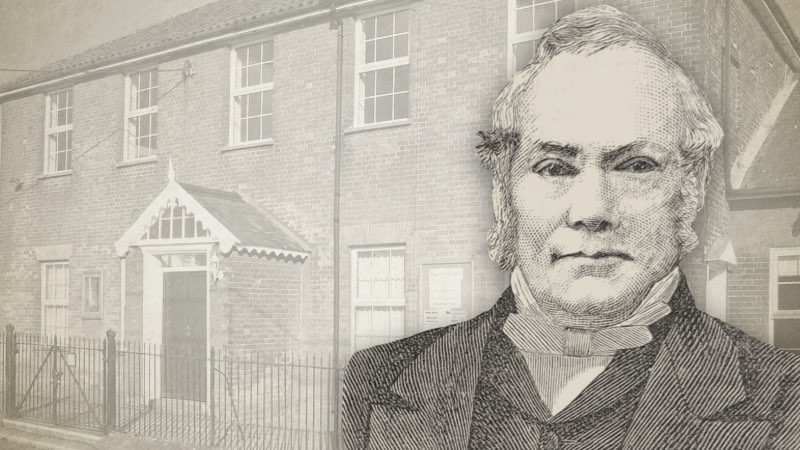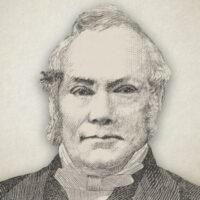
The Life And Ministry Of Samuel Collins
Earthen Vessel 1889, Page 168:
The Late Mr. Samuel Collins, Of Grundisburgh, Suffolk
One of the greatest and grandest Suffolk preachers of the Gospel of the past, known to us, was Samuel Collins, of Grundisburgh. It was not in sunny Suffolk that our ears and heart were first charmed by the pouring out of his soul in tremulous accents on Gospel themes but in that highly favoured sanctuary at Hill Street, Dorset Square, London, of which John Foreman, of blessed memory, was the renowned pastor so many years. It was in the early days of our Christian career, mainly, that we spent several happy Good Fridays in succession at Hill Street with our beloved wife and her parents and friends, and there we heard Samuel Collins preach gloriously on one of those long-to-be-remembered days. James Wells preached in the morning, John Foreman (as was his usual custom) in the afternoon, and Samuel Collins in the evening. In the morning of that day Mr. Collins sat on the left hand-side of the chapel under the gallery, and Mr. Wells, on rising to commence his sermon, cast his keen eyes toward Mr. Collins, and with a shrewd kind of twist of the mouth said, “There sits my brother Collins, he has been busily criticising my ‘Jacob and Esau’ lately, mind I don’t give him a broadsider this morning!” This pertinent remark produced a sudden titter throughout the chapel, but which quickly subsided as the preacher rapidly turned to his subject. Prior to Samuel Collins preaching at Hill Street on the evening in question, we heard for many years consecutively on certain days, in the same chapel, dear old George Murrell, of St. Neots; and never shall we forget the number of fine, old John Bull-sort of worthies who sat at the dinner table in the long schoolroom, with Mr. Foreman at their head, many of whom had come from Suffolk, Cambridgeshire, and other parts of the country, for a thorough good, spiritual feast, and who did not, we should judge, go away disappointed. We were accustomed to see Mr. Collins, for a few years afterwards at the annual gatherings of the Suffolk and Norfolk Association, and to hear him speak occasionally from the huge pulpit in the Association tent. His voice was then mellow (yet plaintive), and his language rich and full of the Gospel of Christ. We did not know his worthy compeer, the late Mr. George Wright, of Beccles, whose biography, by Mr. S. K. Bland, is before us, neither did we ever hear the famous pastor of Meard’s Court preach—the renowned John Stevens—but we have had the happiness of knowing in person many bright pulpit-stars now shining in glory, such as James Wells, John Foreman, Philip Dickerson, John Cooper, George Murrell, Israel Atkinson, Samuel Milner, Charles Box, Thomas Pooke, Charles Waters Banks, George Moyle, George Wyard, William Bull, John Slate Anderson, John Hazelton, William Palmer, Samuel Cozens. T. J. Messer, Thomas Stringer, P. W. Williamson, William Brown, J. Brand, E. Beazley, Henry Wise, William Crowther, William Carpenter, William Houghton, Thomas Steed, William Collyer, John Dixon, Robert Bird, J. W. Dyer, Searle, and other ministerial lights of equal and lesser magnitude, whose souls have long filled their respective places in the temple above. There are still in this lower sphere, who—”Confirm the tidings as they roll, and spread the truth from pole to pole,” and who are not to be outvied by any of the bright satellites of the past. With all due respect to the valiant men of bygone days, it has never been our aim to strike young living ministers with the bleached bones of their great predecessors because, as is too generally supposed, they are in no way equal to them. God has always had His witnesses for truth, and He always will have, although the Church may be favoured with a larger number of them at one time than at another. It is folly to suppose that all men are naturally gifted alike. Dr. Johnson remarks “that no two people can be half an hour together but one shall acquire an evident superiority over the other.”
“God hath His mysteries of grace, ways that we cannot tell;
He hides them deep, like the hidden sleep of him He loved so well.”
The last public appearance of Samuel Collins was, we believe, at Wattisham, on October 1, 1879, at the jubilee of the Suffolk and Norfolk Particular Baptist Association. Our last sight of his venerable person was at Fressingfield, on June 6, 1878, when, after the congregation had sung, “Keep silence all created things,” he read with great pathos, Psalms 62 and 67, and offered prayer, during which we noticed tears flowing freely from the eyes of many of the worshippers. The last time he preached in his own much-loved pulpit was on October 29, 1876; his text on that occasion was from Rev. 14:13. It is considered that Mr. Collins was baptized by good old John Keeble, of Blandford-street. Mr. Bland, in his interesting memoir of Mr. Collins, says: “I have heard him pathetically describe the first time he preached before his pastor, Mr. Stevens (from Rom. 5:1), and his nervous state in the service; how he exhausted all his thoughts on the passage long before the time of closing, and then in despair ‘began at the other end, and worked his theme backwards.” Also Mr. Stevens’ kind words of encouragement afterwards—“All right, Sam; if you can get through a muddle like that, I can trust you anywhere.'” (See Gospel Herald for 1881, p. 321). During Mr. Collins’s long ministerial career at Grundisburgh, he was regarded as the champion preacher of the Gospel far and near. We remember, when visiting the cause at Rishangles two years ago, the beloved pastor, Mr. George Harris (who was a member, in his early days, of Mr. Collins’s Church, and by which he was sent out into the ministry), pointing out to us a pond in a field near his house, and under the shadow of the old Parish Church, where his old pastor, Mr. Collins, baptized a number of persons in the presence of 2,000 spectators and one of that number we buried last year in Waltham Abbey Cemetery.
Mr. Collins took an active interest in the Suffolk and Norfolk Particular Baptist Association, which was formed (out of an older Society) at Grundisburgh in the October of 1829, the jubilee of which he lived to see held at Wattisham. We remember his fine old chapel at Grundisburgh, when the Association met in that locality three years ago. Our highly esteemed brother, William Gill, is the present pastor, and worthy successor of Samuel Collins. In 1833 the Gospel Herald was originated by Mr. Collins, and edited by him for twenty-five years. He held his pastoral charge at Grundisburgh for nearly fifty years, and resigned it in 1876 without a blemish on his character.
Mr. Collins was a Northamptonshire man born in the parish of Culworth, in that county, December 2, l798, and after a long and useful life, chiefly spent in the Lord’s service he fell asleep in Jesus on Sabbath-day evening, July 17, 1881. The last words he was heard to articulate were: “All-all glory!” His disembodied spirit now fully realizes that eternal “weight of glory” which he so long patiently waited for, and is satisfied.
“Thither our weak and weary steps are tending—
Saviour and Lord do Thou with us abide!
O guide us homeward where our wanderings ending
We shall see Thee, and shall be satisfied!
Editor
Samuel Collins (1798-1881) was a Strict and Particular Baptist preacher. He was appointed pastor of the chapel at Grundisburgh, a position he held for nearly fifty years. In 1833, he started the Strict Baptist magazine, “Gospel Herald”, and served as editor for twenty-five years.



